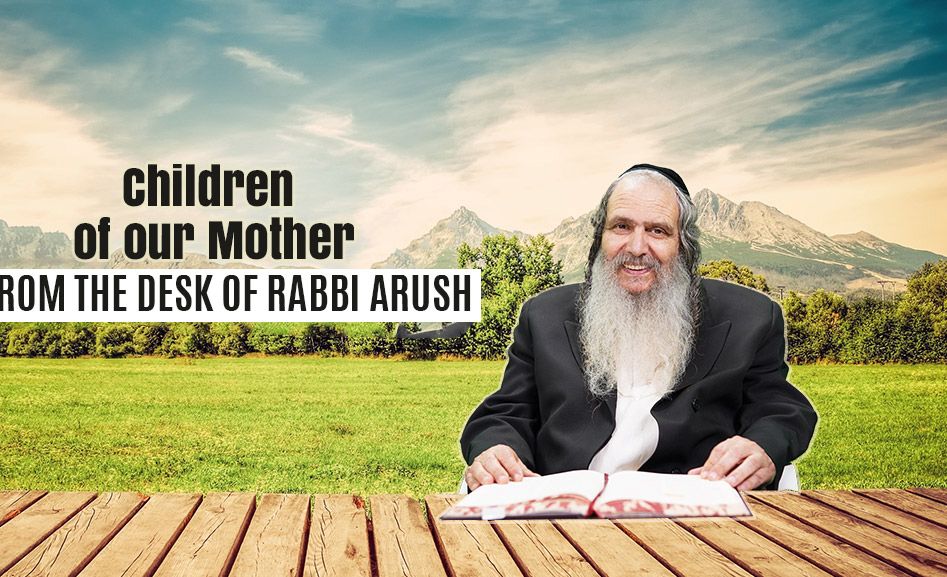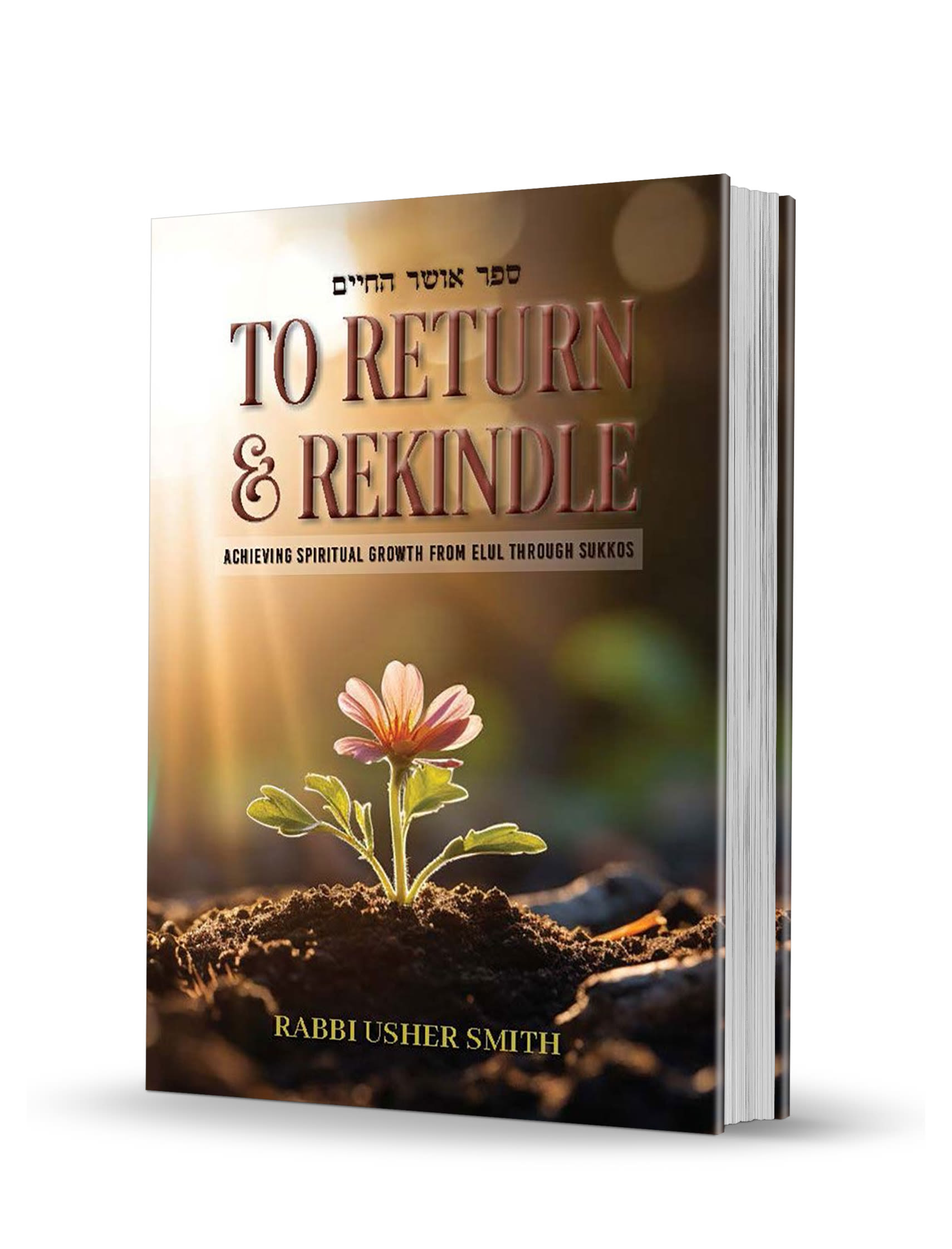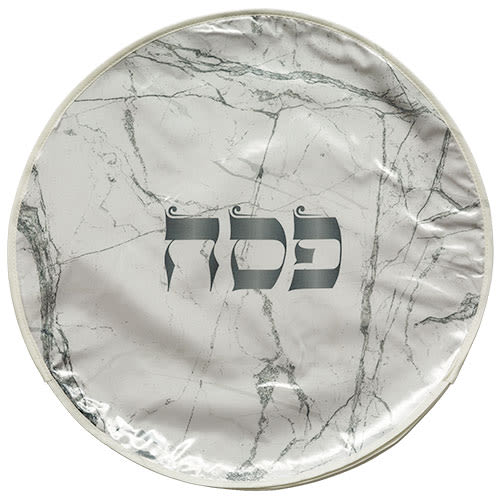
A Matter of Time
The worst transgression in the Torah is that a person can live 70-80 years and not know that he has a Father in Heaven Who loves him like a son! Our teshuvah and redemption depend on internalizing this.

Translated from Rabbi Arush’s feature article in the weekly Chut shel Chessed newsletter. The articles focus on his main message: “Loving others as yourself” and emuna.
Rabbi Aharon’s Surprise
The chassidim of great Rabbi Aharon of Karlin were very surprised by the question their Rebbe asked them and began to debate the answer vigorously. They tried to offer him a good answer a few times, but each time they did so, he rejected their answers.
The great Rabbi Aharon of Karlin, asked his chassidim a seemingly simple question: “What is the worst aveira (transgression) in the Torah?” When he saw that the chassidim were nowhere near the answer, he decided to give them a hint: “It’s an aveira that is not written in the Torah!”
This “hint” just confused the chassidim even more, and after a long discussion, they gave up and went back to their Rebbe to hear the answer. And his answer surprised them very much:
The worst aveira is the fact that a person lives in this world seventy or eighty years and doesn’t know that he has a Father in Heaven Who loves him like a son!
The disciples were amazed – but we are not at all surprised by it. After everything we have learned and explained about the depth of the song “Hashem always loves me” – it is crystal-clear to us. The emuna (faith) that Hashem loves me, or to be more exact, the clear knowledge that Hashem loves me and that I will have only good and even better – is the foundation of emuna, and emuna includes the entire Torah. Knowing that Hashem loves me is the pnimiyut (the inner core) of emuna.
Everything is Built on Love
The only way that the yetzer hara (evil inclination) can reach a person’s heart is to just trick him into thinking that Hashem doesn’t love him, or to dim and blur his knowledge that Hashem loves him. When a person doesn’t feel loved, he loses all his desire for life, his motivation, his will and his aspiration to do good and to improve and elevate himself. And when the pit is empty, without any water in it, then the snakes and scorpions invade; in other words, all kinds of bad desires take over and confuse him.
And therefore, when we see someone far, far away from Hashem, Heaven forbid, and doing all kinds of aveiras, we must know and understand that the root of all this is the fact that he doesn’t know that Hashem is a good Father Who loves him and wants him, and is proud of him and wishes him to draw closer, and that all Hashem wants is to do good for him.
So, we see that everything stands on the knowledge that Hashem loves me, and when that knowledge is indistinct or is lacking altogether – that is the root and the foundation of all aveiras and of all the distance from Hashem.
And so, our song is spreading throughout the Jewish People and is awakening in every Jew the deep emuna that Hashem loves him or her, and only wants to do good for him or her – that is the greatest and deepest process of teshuva (repentance), because this song is causing the Jewish people to repent on the most severe aveira in the Torah and to remove the cause and the root of all aveiras, and to start to believe and know and feel that Hashem loves them. From then on, the process of teshuva can only move forward and be even better and better.
No Pressure
But one needs patience as well. Because since the emuna that Hashem loves me and that I will have only good is the foundation of faith, it goes hand in hand with much patience. As Rabbeinu says – “Erech apayim (patience) is connected to emuna.”1 Why is emuna patience?
Rabbeinu says that emuna is the force that develops and grows. Growing is a process; it’s not a quick fix. A process takes time, and one doesn’t see quick results, but there is constant progress. Growing is always “better and better”; we must not be impatient on the way; rather, we should continue to believe that things will be better and better, until we see perfect results.
It is like when we are raising our children: We cannot expect them to learn to run within a month and finish the entire Talmud within two months; rather, we must wait for years, as the child grows and develops all the time, adds knowledge and understanding. It is the same in any realm in life, and especially in the realm of releasing the soul from all base desires and bad traits, as well as releasing the soul from the fears and anxieties and from all emotional suffering. And even when there are physical illnesses, the more you believe that Hashem loves you and that things will get better, the more you are on the right path, on the way to improvement. And then, indeed every day everything gets better and better. So don’t break down because you are still struggling to cope and are not seeing perfect results.
Until When?
In this week’s parasha [Bo], the Jews had already seen the Egyptians suffer from seven powerful plagues, and they [the Jews] were no longer enslaved. Pharaoh saw Hashem’s complete control over all creation, wondrous things that were never seen before, and even the chartumim (advisors) admitted that it was “the finger of G-d.”2 We would expect Pharaoh to release Bnei Yisrael immediately. But Hashem hardened his heart, plague by plague, and he didn’t surrender. He was a stubborn one.
One can see all of Hashem’s good: There was no enslavement anymore, and Bnei Yisrael had become rich, and all the Egyptians wanted to release them – and with all that one can continue to look forward to the geula (redemption). On the other hand, one can see that the complete geula hadn’t happened yet and give up. And, indeed, there were Jews who despaired and gave up on the geula!
Such despair is the exact opposite of emuna. The section of the Mishna that deals with agriculture – about raising and growing plants – is called Seder Zera’im; but it is also called Seder Emunat (faith). Because nothing can be grown without emuna, without patience.
Today we know that every plague had a goal, and that the Jewish People could not go from slavery to freedom in a single moment, but rather they had to go through a long process of emotional release from the slavery and build their emuna step by step. And this process, which lasted about a year – was considered as if they had left “in haste,” as we learn in this parasha, for such processes can take years.
More Wicked Than Datan and Aviram?
That is why many Jews died during the Plague of Darkness.3 Chazal say that it was the resha’im – the wicked – who died then.
Rabbeinu Asher asks: We encounter very wicked people who did leave Egypt, like Datan and Aviram – why didn’t they die, and in what way was the wickedness of those that died greater than theirs?
In his commentary on the Torah, Rabbeinu Asher (the Rosh) gives an amazing answer that sounds like it was taken from Rabbi Nachman’s books: Those that died were those who had despaired of the geula.
We may ask about the Rosh: How could that be? The Plague of Darkness was the ninth plague! We had here Jews who had seen eight amazing plagues, all predicted by Moshe Rabbeinu; in every plague they had seen how Hashem distinguished the Jews and protected them – and yet they despaired of the geula?!
So, one needs to say that those Jews who gave up had no patience; they were impatient, as the Torah says: “but in the brokenness of their spirit and the brutal labor they did not listen to him.”4 A person who has no patience doesn’t hear and doesn’t feel and doesn’t see emuna. More than that – he sees everything upside down. He is waiting to see perfect results and he doesn’t see the extent to which everything is becoming better and better. He doesn’t notice the process of geula that is going forward, building up, growing.
And that is why those poor Jews gave up on their emuna, and according to Rabbi Aharon of Karlin, whose statement we brought above – that is the worst aveira. And so, even though Datan and Aviram were extremely wicked, as long as they believed that Hashem loved them and that there was a process of geula going on there – they had the right to be saved; there was hope for them. But those that despaired had lost their emuna that Hashem loved them and that was the worst aveira, so they did not leave Egypt.
Today, too, we see wondrous things and amazing changes in the Jewish People; immense fountains of emuna are gushing forth. But there are those who want to see the Mashiach here and now and want to see everyone doing complete teshuva here and now; but everyone must be patient and brace themselves and understand that the more we see only the good, and see how this good is growing more and more, and believe that things will be good and even better – so the geula process will move forward, the geula will continue to grow with greater vigor, as we say, “matzmiach keren yeshua (Who causes the power of salvation to flourish)”5, and we will all be redeemed together with all Yisrael speedily, in our days.
Editor’s Notes:
1 Likutei Moharan 155:2
2 Shemot (Exodus) 8:15
3 Shemot 20:21-29
4 Shemot 6:9
5 The 15th blessing in the Shemonah Esrei (Amida) for the Davidic reign










Tell us what you think!
Thank you for your comment!
It will be published after approval by the Editor.